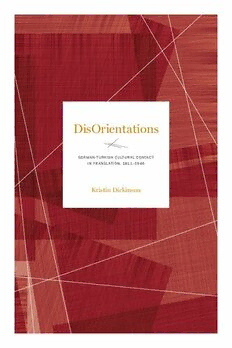
DisOrientations: German-Turkish Cultural Contact in Translation, 1811-1946 PDF
Preview DisOrientations: German-Turkish Cultural Contact in Translation, 1811-1946
DisOrientations GERMAN-TURKISH CULTURAL CONTACT IN TRANSLATION, 1811–1946 Kristin Dickinson DisOrientations The Max Kade Research Institute Series: Germans Beyond Europe Series Editor Founding Editor Daniel Purdy A. Gregg Roeber The Max Kade Research Institute Series is an outlet for scholarship that examines the history and culture of German-speaking communities in America and across the globe from the early modern period to the present. Books in this series examine the movements of the German- speaking diaspora as influenced by forces such as migration, colonization, war, research, religious missions, or trade. This series explores the historical and cultural depictions of the international networks that connect these communities, as well as linguistic relations between German and other languages within European global networks. This series is a project of the Max Kade Research Institute located on Penn State’s campus. It was founded in 1993 thanks to a grant from the Max Kade Foundation, New York. DisOrientations German-Turkish Cultural Contact in Translation, 1811–1946 The Pennsylvania State University Press Kristin Dickinson University Park, Pennsylvania An earlier version of chapter six appeared as “Intervening in the Humanist Legacy: Sabahattin Ali’s Kleist Translations,” Turkish- German Studies Yearbook 8 (Spring 2017). Library of Congress Cataloging-in-Publication Data Names: Dickinson, Kristin, 1981– author. Title: DisOrientations : German-Turkish cultural contact in translation, 1811–1946 / Kristin Dickinson. Other titles: Max Kade German-American Research Institute series. Description: University Park, Pennsylvania : The Pennsylvania State University Press, [2021] | Series: Max Kade Research Institute series: Germans beyond Europe | Includes bibliographical references and index. Summary: “Explores the German-Turkish literary-cultural relationship from 1811 to 1946, focusing on literary translation as a complex mode of cultural, political, and linguistic orientation”—Provided by publisher. Identifiers: LCCN 2021010374 | ISBN 9780271089843 (cloth) Subjects: LCSH: Turkish literature—19th century—Translations into German—History and criticism. | Turkish literature— 20th century—Translations into German—History and criticism. | German literature—Translations into Turkish— History and criticism. | Turkey—Relations—Germany. | Germany—Relations—Turkey. Classification: LCC PL209 .D53 2021 | DDC 894/.35—dc23 LC record available at https://lccn.loc.gov/2021010374 Copyright © 2021 Kristin Dickinson All rights reserved Printed in the United States of America Published by The Pennsylvania State University Press, University Park, PA 16802–1003 The Pennsylvania State University Press is a member of the Association of University Presses. It is the policy of The Pennsylvania State University Press to use acid-free paper. Publications on uncoated stock satisfy the minimum requirements of American National Standard for Information Sciences—Permanence of Paper for Printed Library Material, ansi z39.48–1992. For Tuncay Contents Acknowledgments (ix) Introduction: Translational Orientations (1) Part 1: Johann Wolfgang von Goethe: “Exceptional” Translations Across the Nineteenth Century 1. Orientalism and Weltliteratur: The Ottoman Disorient in Goethe’s West-East Divan (37) 2. Translations with No Original: Reading Werther in Ottoman Turkish (64) Part 2: Friedrich Schrader: Translating Toward the Future 3. Translating Beyond the Civilizing Mission: Ahmet Hikmet Müftüoğlu and the Ottoman Dandy (87) 4. Political Orientations: On (Re)translating Halide Edip Adıvar’s The New Turan (119) Part 3: Sabahattin Ali: Theorizing World Literature from Early Republican Turkey 5. A Prelude in Potsdam: World Literature as Translational Multiplicity (147) viii Contents 6. Silencing the Ansatzpunkt: World Literature as Radical Interrelationality (166) Epilogue (193) Notes (201) Bibliography (234) Index (250) Acknowledgments This book has benefitted from the generous support of numerous insti- tutions, colleagues, and dear friends. I conducted research for chapters one, two, and five as a fellow with the Social Science Research Council. I later researched and wrote chapters three and four as a fellow at the Inter- national Research Center for Cultural Studies (IFK) in Vienna, Austria. The University of Michigan generously provided funding for a manuscript workshop. I am especially grateful for the detailed feedback I received at this workshop from Leslie Adelson and Azade Seyhan. Their thorough and thoughtful comments have shaped and strengthened this book, just as their scholarship has served as an important source of inspiration for my own. I would also like to thank the many people I have worked with at Pennsylva- nia State University Press to bring this book to fruition, including Daniel Purdy, Kathryn Bourque Yahner, Laura Reed-Morrisson, Maddie Caso, Alex Ramos, and Leyla Aksu. Numerous colleagues at the University of Michigan have also read and commented on different sections of this book over the past five years, including Maya Barzilai, Gottfried Hagen, Julia Hell, Fred Amrine, Helmut Puff, Kerstin Barndt, Silke-Maria Weineck, Peter McIsaac, Scott Spector, Tyler Whitney, and Kira Thurman. Yopie Prins and Scotti Parrish provided valuable feedback on my book proposal. Special thanks go to Andreas Gailus for his detailed comments at different stages of the writing process. And I am particularly grateful to Johannes von Moltke for his advice on questions of structure and theoretical framing. Damani Partridge and Kira Thurman also offered much-needed moral support and encouragement at different stages of this project. Thought-provoking conversations with graduate students at the University of Michigan have contributed to the lines of thought I develop in this book in more ways than one. It has been a pleasure working with Duygu Ergun, Matthew Liberti, Ali Bolcakan, Elizabeth McNeill, Özlem
